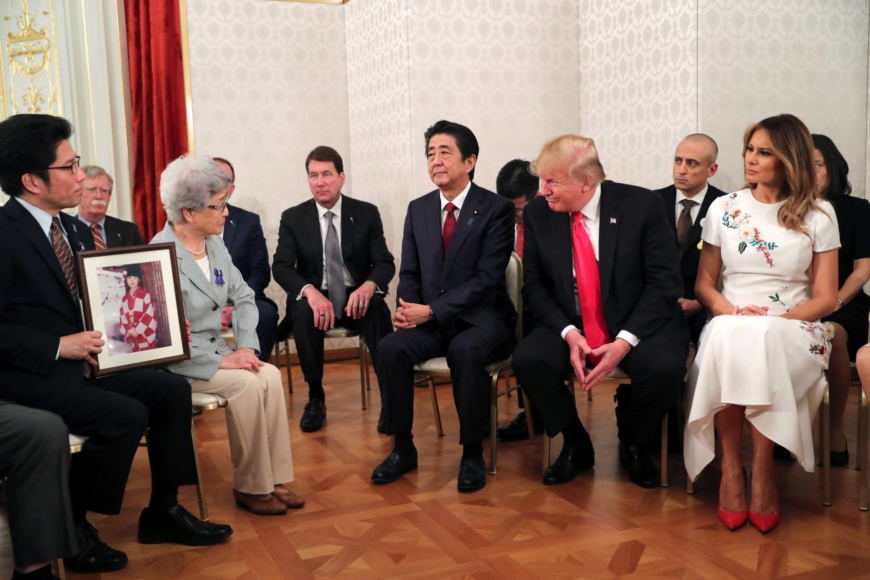PYEONGTAEK, SOUTH KOREA – Over the previous few weeks, North Korean abductions’ difficulties has as soon as once more earned the highlight in Japanese politics. In a U.N. assembly, the Japanese delegate referred to as on the North Korean consultant to work with Japan with addressing “abductions and compelled disappearances.” But Later on, Prime Minister Yoshihide Suga attended the memorial service of Shigeru Yokota, father of a juvenile abductee and long-time advocate for a decision on the kidnapping problem. There, Suga has renewed his pledge to make a breakthrough with North Korea — a goal he reiterated as soon as once more in his first coverage speech to the Weight-reduction plan several days in the past.
However, does this imply something? Can Suga truly make progress on the kidnapping problem, and what does this portend for Japan-North Korea relations?
A fast assessment of the difficulty and precedent is useful right here.
Within the 1970s and ’80s, North Korean brokers kidnapped Japanese residents to use them in specialized roles, resembling educating Japanese language and tradition. The Japanese authorities confirmed 17 victims of abduction (although it tasks the precise quantity to be considerably larger) and have sought all Japanese abductees’ repatriation.
Within the early 2000s, the North Korean authorities admitted to abducting 13 of the 17 Japan recognized. North Korean authorities allowed 5 of them to return to Japan, however, claimed the others had both perished or by no means entered North Korea in the first place. The Japanese authorities dispute this and have regularly requested a complete investigation and determination of this matter.
Both the Japanese and North Korean governments have engaged formally on the kidnapping problem on several occasions up to now twenty years. The subject was raised throughout summit-level negotiations in 2002 and 2004, respectively, which yielded the 5 abductees’ return in alternate for financial concessions.
After a decade-long hiatus, negotiations resumed on the working degree in 2014 with five rounds of talks. These were a settlement for Japan to elevate unilateral sanctions in opposition to North Korea in alternate for progress on the kidnapping problem. The North Korean facet deserted other engagements, asserting that the matter was concluded because it proceeded to ramp up its nuclear and missile testing actions.
Though situations are completely different now than in 2014, the North Korean authorities have continued reiterating that the kidnapping problem is totally resolved. Recording this place now presents a hazard to the Kim Jong Un regime’s status on the world stage. It threatens to amplify North Korea’s already notorious standing amongst human rights violators. The regime shall be loath to accept these prices, even when offered with Japanese monetary compensation.
Regardless of this, a key precept in negotiation is “no all the time, no by no means,” which means that nothing is assured, and nothing must be dominated out. There’s all the time an opportunity for a deal, although it seems exceedingly slim at this level for Japan and North Korea.
As soon as North Korea begins stress-free its draconian COVID-19 restrictions to permit for expanded overseas contact, there exists a slim zone of a possible settlement between Japan and North Korea predicated on a ‘cash-for-abductee’ method. That is provided that the two events can overcome the opposite challenges at play.
One problem is the milieu of different pursuits. For instance, Tokyo needs to handle North Korea’s nuclear and missile capabilities. In contrast, Pyongyang goals to keep up regime status, particularly as the federal government seeks to exhibit good governance amidst a pandemic, worldwide sanctions, and pure disasters that affected the nation. These and different competing pursuits complicate any potential negotiations on the kidnapping problem.
One other problem is looking for a settlement that doesn’t violate U.N. sanctions. North Korea would assuredly search financial compensation and help for any motion on the kidnapping problem, however sanctions underneath U.N. Safety Council Decision 1718 prohibit any supply of products or cash which could be funneled into the nation’s nuclear or missile applications. This narrows the choices accessible on the negotiating desk.
These challenges are notable; however, it will not cease the Suga authorities from pursuing the kidnapping problem. From the Japanese perspective, three elements are driving this continued effort, whatever the sticking factors.
First, there’s a social issue. Households are searching for closure, and their shared tales will supply compelling narratives in Japanese media. So long as the general public maintains problem consideration, it should contribute to the subsequent issue.
The second is a political issue. In 1998, smaller activist teams got here collectively to type the Sukuukai, or “Nationwide Affiliation for the Rescue of Japanese Kidnapped by North Korea.” Bolstered by media consideration on the kidnapping problem, the particular curiosity group has since expanded to 36 chapters throughout Japan and gained legal help from six political events comprising over 90 % of sitting Weight-reduction plan members. To be aware, in 2005, these politicians all supported a precondition that Japan wouldn’t normalize ties with North Korea till the kidnapping problem was resolved.
The truth that one of many staunchest supporters of the Sukuukai, Shinzo Abe, occurred to function as prime minister for nearly 9 of the previous twenty years has contributed to the political vitality behind the kidnapping problem. He had personally been concerned within the 2002 and 2004 summits in Pyongyang and maintained this coverage agenda merchandise throughout his complete two tenures as prime minister.
Regardless of Abe’s departure, Suga is available in having served because of the minister in control of the kidnapping problem, whereas concurrently appearing because of the chief Cupboard secretary. Thus, from a problem consideration and coverage platform perspective, the kidnapping problem will not fall off the Japanese political agenda anytime quickly.
The third issue is sensible. For Japanese authorities officers, if North Korea is unwilling to decide illicit acts perpetrated forty years in the past, how can they anticipate North Korean dedication to denuclearization or different points that directly influence safety and nationwide survival within the current day? The very fact stays that the kidnapping problem is a litmus take a look at for dedication.
Given all this, from a negotiating perspective, Japan should observe several fundamental rules. The primary is that Japanese officers should lay the groundwork for an implementable cope with North Korea. The Japanese authorities should decide what it might be prepared to supply in alternate for progress on the kidnapping problem and guarantee there aren’t any legislative roadblocks to delivering these issues if a deal had been struck. It should go to the U.N. 1718 sanctions committee to realize an exemption that may enable monetary concessions and help on humanitarian grounds. Having actionable settlements in hand shall be vital for gaining North Korean reciprocity.
The second precept is retaining this problem out of the general public eye till it’s satisfactorily resolved. Given the general public and political curiosity, the Japanese authorities should take robust measures to maintain negotiations in again channels and forestall leaks. If it involves mild that the Kim regime is loosening its place right here, it should trigger the North Korean authorities to close off talks as soon as once more.
Lastly, the Japanese authorities should preserve this problem remoted from different negotiations. Whereas it could appear enticing for Japan to enlist various authorities’ help, including other pursuits and tying the kidnapping problem to talks that will contain the denuclearization downside will solely make progress tougher to realize.
With the kidnapping problem persevering with to tell the Suga administration’s North Korea coverage, the federal government should alter its method if it hopes for progress. Suga and his cohort should resist the urge to make a political spectacle of the kidnapping problem, focusing as a substitute on no-frills, transactional negotiations behind closed doorways. Till then, this problem will stay a political narrative slightly than a substantive coverage goal.
Dr. Michael MacArthur Bosack is the particular adviser for presidency relations on the Yokosuka Council on Asia-Pacific Research. He beforehand served within the Japanese authorities as a Mansfield Fellow.















Leave a Reply